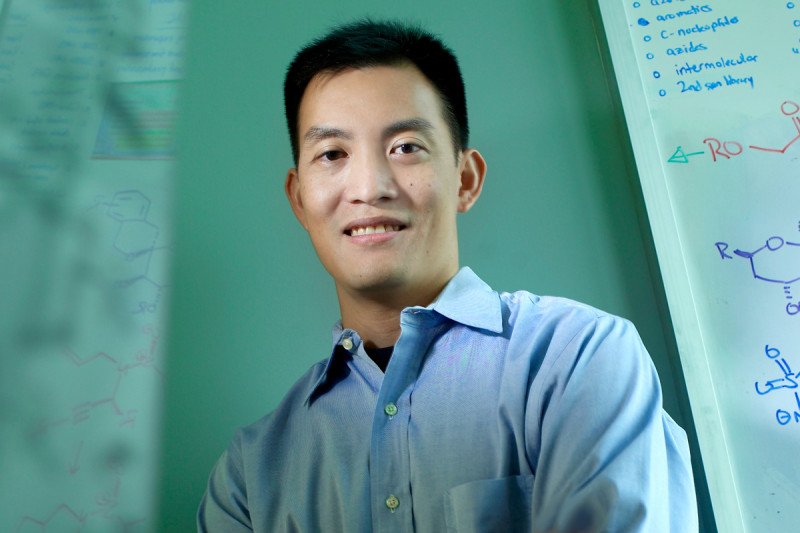

Chair, Chemical Biology Program, SKI, 2015-present
Director, Tri-Institutional PhD Program in Chemical Biology, 2012–present
Member, 2012-present
Tri-Institutional Professor, 2013-present
Associate Member, 2008–2012
Tri-Institutional Associate Professor, 2008–2013
Assistant Member, 2002–2008
Tri-Institutional Assistant Professor, 2003–2008
PhD, Harvard University, 2000
BS, Stanford University, 1995
Alfred P. Sloan Research Fellow, 2007–2009
James D. Watson Investigator, 2005–2007
Damon Runyon Postdoctoral Fellow, 2000–2002
Biography
Derek S. Tan was born and raised in Rochester, New York. His parents, both chemists at Eastman Kodak, discouraged him from going into chemistry, and so, naturally, he became a chemist. He received his BS in Chemistry from Stanford University in 1995, working with Prof. Dale G. Drueckhammer on the dynamic enzymatic resolution of thioesters. He then went onto graduate studies with Prof. Stuart L. Schreiber at Harvard University, carrying out early research in the field of diversity-oriented synthesis. His work included the synthesis of a combinatorial library of over two million polycyclic small molecules derived from shikimic acid. After receiving his PhD in Chemistry in 2000, he joined the laboratory of Prof. Samuel J. Danishefsky at the Memorial Sloan Kettering Cancer Center (MSK), where he studied natural products total synthesis and helped complete the first total synthesis of the novel terpenoid antibiotic, guanacastepene A.
He began his independent career in 2002 as an Assistant Member in the Molecular Pharmacology & Chemistry Program of the Sloan Kettering Institute for Cancer Research (SKI) at MSK, and was appointed as a Tri-Institutional Assistant Professor at The Rockefeller University and Weill Cornell Medical College in 2003. He was promoted to Associate Member and Tri-Institutional Associate Professor in 2008 and to tenured Member in 2012 and Tri-Institutional Professor in 2013. In 2015, he was appointed Chair of the newly formed Chemical Biology Program in SKI. Since 2012, he has also been the Director of the Tri-Institutional PhD Program in Chemical Biology, a joint graduate program offered by MSK, The Rockefeller University, and Weill Cornell Medical College.
His current research interests center on the development of new chemical strategies toward and biological applications of molecules inspired by natural products. His laboratory leverages forefront methodologies in organic synthesis and multidisciplinary collaborations with biologists to identify new chemical probes that address a variety of biological targets implicated in cancer and infectious diseases.
News Articles
03/22/2018
Antibiotic Discovery Webinar: Penetrating Gram-Negative Bacteria
CDD Collaborative Drug Discovery
Gram negative bacteria present an important medical challenge because their outer membrane protects them from many antibiotics. This CDD webinar presents the latest scientific progress on understanding and circumventing this phenomenon by applying both modeling and experimental methods to validate hypotheses. Dr. Brad Sherborne (Merck) hosts an engaging discussion on this topic with Prof. Derek Tan (Memorial Sloan Kettering Cancer Center) and Prof. Helen Zgurskaya (University of Oklahoma). [Video and Slide Presentation]
05/15/2017
New rules for Gram-negative antibiotics
Chemical & Engineering News
In the fight against pathogenic bacteria, Gram-negative bacteria such as Escherichia coli and
Pseudomonas aeruginosa are particularly challenging foes. A new study by Prof. Paul Hergenrother’s group demonstrates the power of a systematic approach to assessing the influence of physicochemical properties on compound accumulation in Gram-negative bacteria. [Full text]
11/2015
An interview with Derek Tan
MSK Center News
Chemical biology is bringing new analytic techniques, molecular probes, and potential therapeutic leads to biomedical research — and to cancer research in particular. To take advantage of this new vanguard, Memorial Sloan Kettering has created a Chemical Biology Program within the Sloan Kettering Institute under the leadership of chemist Derek Tan. [PDF]
09/17/2015
Voices of Chemical Biology: What do you value most about being part of the chemical biology community?
Nature Chemical Biology
As part of its 10th anniversary, Nature Chemical Biology asked leading chemical biologists for their views on a variety of issues pertinent to the field. In this issue, Derek Tan comments on the pen-minded, innovative spirit of chemical biologists. [Full Text]
09/08/2015
Drug Development & Discovery and Scientific Uncertainty
Science Forward Video Series: Season 2
Derek Tan has been featured in Science Forward, a video series produced by the Macaulay Honors College at the City University of New York (CUNY). In the video on “Drug Development and Discovery”, Derek talks about the wide range of skills and approaches chemical biologists use to design and synthesize new potential drugs. Viewers can catch a glimpse of the Tan lab as well as TPCB student Michaelyn Lux in action. In “Scientific Uncertainty”, Derek is quoted on the exciting role of uncertainty in our research. [Science Forward: Drug Development and Discovery | Scientific Uncertainty]
08/18/2015
New Chemical Biology Program brings power of chemistry to biomedical research
MSK On Cancer Blog
MSK has established the Chemical Biology Program to leverage the growing role of chemistry in biomedical research. The first new Sloan Kettering Institute program in over a decade is chaired by Derek Tan. [Full text]
07/21/2015
Voices of Chemical Biology: What is the most significant challenge facing chemical
biology as a discipline?
Nature Chemical Biology
As part of its 10th anniversary, Nature Chemical Biology asked leading chemical biologists for their views on a variety of issues pertinent to the field. In this issue, Derek Tan comments on the challenges and opportunities of multidisciplinary collaboration. [Full Text]
09/16/2013
Taking clues from Nature for the development of new drugs
MSK On Cancer Blog
Natural products are molecules that are produced by living organisms. They are often made by bacteria and fungi, but they may also be made by plants and animals. Derek Tan discusses why natural products offer inspiration for the development of new drugs. [Full text]
01/28/2013
Ringing in new drug candidates
Chemical & Engineering News
Many compound screening collections consist primarily of molecules that do not possess the structural, stereochemical, and functional complexity equivalent to that of natural products. Prof. Paul Hergenrother’s group has reported a new ring distortion method of constructing natural-product-like libraries to address that deficiency. [Full text]
08/22/2012
Trojan horse tuberculosis treatment
Chemistry World
The emergence of drug resistant bacterial strains has led to an urgent need for new antibiotic agents. Prof. Marvin Miller’s group is utilising the iron uptake pathway of Mycobacterium tuberculosis as a ‘Trojan horse’ approach to tuberculosis treatment. [Full text]
05/12/2008
Working at the Hospital: Challenging and rewarding careers in chemistry await at research hospitals and medical centers
Chemical & Engineering News
For many chemists, the traditional career path begins with a job in industry or a position leading to a tenure-track spot in an academic department. But synthetic, medicinal, and organic chemists are increasingly carving out rewarding careers at research hospitals and medical centers. [Full text]
11/01/2007
An Interview with Derek Tan
MSKCC Center News
To understand biology, scientists often use the power of chemistry. As the head of a laboratory in the Molecular Pharmacology and Chemistry Program at the Sloan Kettering Institute, Derek Tan is a young leader in the field of chemical biology. [Full text]
05/17/2006
Chemical Biology Initiative Symposium 2006: Frontiers of Drug Discovery: Chemical Library Development and Screening
University of Minnesota
The ability to design chemical probes capable of modulating and altering biological processes in highly defined ways is essential to carrying out modern biomedical and pharmaceutical research. The aim of this workshop was to inform biomedical, pharmacological, medicinal, computational and chemical researchers at the University of Minnesota of recent advances in chemical library design and screening with the goal of fostering multidisciplinary research projects harnessing these techniques. [Program]
04/13/2005
Governor, Majority Leader and Speaker Announce $2 Million in Biotech Research Awards: Targeted funding will help attract, retain promising early career scientists
NYSTAR
Governor George E. Pataki, Senate Majority Leader Joseph L. Bruno and Assembly Speaker Sheldon Silver announced $2 million in [James D. Watson Investigator Program] awards designed to recognize and support outstanding scientists and engineers who, early in their careers, show potential for leadership and scientific discovery in the field of biotechnology. [Full text (PDF)]
01/04/2005
NIH Initiatives Target Chemistry: New road-map-related initiatives show agency values role of chemistry in biomedical research
Chemical & Engineering News
Graduate student Shiying Shang and postdoctoral fellow Jae-Sang Ryu work on developing diversity-oriented syntheses of libraries in the lab of Tan—work that fits nicely into a new road-map-related initiative. [Full text (membership req’d) | Full text]
10/04/2004
Rescuing CombiChem: Diversity-oriented synthesis aims to pick up where traditional combinatorial chemistry left off
Chemical & Engineering News
What distinguishes DOS from traditional combichem? For one thing, DOS libraries typically consist of tens to hundreds of compounds, versus the tens of thousands to millions of compounds produced in many traditional combinatorial syntheses. Also, most DOS compounds have cyclic architectures and resemble natural products-which are often designed by nature to be biologically active from the start-whereas compounds generated by traditional combichem weren’t necessarily that complex. [Full text]
08/10/2004
Tireless Hunter of Cures and Kids
New York Post
Derek Tan, a 31-year-old organic chemist who has been part of the campaign to help missing children since he was a teenager, lives by a simple formula. “It comes back to trying to address people issues,” said Tan, who heads a research lab at Memorial Sloan Kettering Cancer Center and also serves as an advisory board member to the Manhattan office of the National Center for Missing & Exploited Children. [Excerpt | Full text ]
06/01/2004
James Engstrom and Derek Tan are Named Members of the Field of Chemistry
Cornell Chemistry and Chemical Biology Newsletter
The department is pleased to announce the addition of James R.Engstrom and Derek S. Tan to the graduate field of chemistry. [Full text ]
11/20/2003
Access is uppermost for research collaborators in Tri-Institutional program
Cornell Chronicle
For biomedical educators who have joined the Tri-Institutional Research Program (TIRP), it’s all about access — access to the technological resources, to potential scientific collaborators and to the top-tier students they need to do their very best work.
Disclosures
Members of the MSK Community often work with pharmaceutical, device, biotechnology, and life sciences companies, and other organizations outside of MSK, to find safe and effective cancer treatments, to improve patient care, and to educate the health care community. These activities outside of MSK further our mission, provide productive collaborations, and promote the practical application of scientific discoveries.
MSK requires doctors, faculty members, and leaders to report (“disclose”) the relationships and financial interests they have with external entities. As a commitment to transparency with our community, we make that information available to the public. Not all disclosed interests and relationships present conflicts of interest. MSK reviews all disclosed interests and relationships to assess whether a conflict of interest exists and whether formal COI management is needed.
Derek Tan discloses the following relationships and financial interests:
-
Adjuvance Technologies
Intellectual Property Rights -
Aflac Inc.
Equity -
Amgen
Equity -
Bristol-Myers Squibb
Equity -
CVS Caremark Corp
Equity -
Institute for Research in Biomedicine Barcelona
Professional Services and Activities -
Medtronic
Equity
-
Merck & Co Inc.
Equity -
Moderna, Inc.
Equity -
Regeneron Pharmaceuticals, Inc.
Equity -
Research Center for Molecular Medicine of the Austrian Academy of Sciences (CeMM)
Professional Services and Activities -
Solventum Corporation
Equity -
Tri-Institutional Therapeutics Discovery Institute
Fiduciary Role / Position -
UnitedHealth Group
Equity
The information published here is a complement to other publicly reported data and is for a specific annual disclosure period. There may be differences between information on this and other public sites as a result of different reporting periods and/or the various ways relationships and financial interests are categorized by organizations that publish such data.
This page and data include information for a specific MSK annual disclosure period (January 1, 2024 through disclosure submission in spring 2025). This data reflects interests that may or may not still exist. This data is updated annually.
Learn more about MSK’s COI policies here. For questions regarding MSK’s COI-related policies and procedures, email MSK’s Compliance Office at [email protected].
View all disclosures
